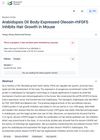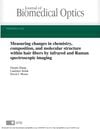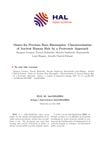19 citations,
July 2020 in “EBioMedicine” A gene variant increases the risk of a type of hair loss by affecting hair protein production.
 17 citations,
December 2010 in “Journal of Investigative Dermatology”
17 citations,
December 2010 in “Journal of Investigative Dermatology” Flightless I protein affects hair growth, with low levels delaying it and high levels increasing hair length in rodents.
 11 citations,
June 2022 in “Frontiers in immunology”
11 citations,
June 2022 in “Frontiers in immunology” New protein changes may be involved in the immune attack on hair follicles in alopecia areata.
11 citations,
November 2021 in “ACS applied nano materials” Keratin-associated protein nanoparticles from human hair may help stop bleeding quickly and safely.
 7 citations,
June 2021 in “Amino acids”
7 citations,
June 2021 in “Amino acids” Human hair protein modifications could potentially indicate heart disease risk.
5 citations,
June 2020 in “Therapeutic drug monitoring” Hair sample weight is a better measure for cortisol levels in hair than hair protein concentration.
 March 2023 in “Biomedicine & Pharmacotherapy”
March 2023 in “Biomedicine & Pharmacotherapy” GPR40 agonists help hair growth through the protein ANGPTL4.
 February 2022 in “Research Square (Research Square)”
February 2022 in “Research Square (Research Square)” A protein made in a plant stopped hair growth in mice.
 98 citations,
June 2001 in “Journal of biological chemistry/The Journal of biological chemistry”
98 citations,
June 2001 in “Journal of biological chemistry/The Journal of biological chemistry” A cluster of sulfur-rich hair protein genes was found on chromosome 17.
 71 citations,
June 2001 in “American Journal of Pathology”
71 citations,
June 2001 in “American Journal of Pathology” The p53 protein helps control hair follicle shrinking by promoting cell death in mice.
 November 2023 in “Advanced Science”
November 2023 in “Advanced Science” A specific hair protein variant increases the spread of breast cancer and is linked to worse survival rates.
20 citations,
December 2013 in “PTR. Phytotherapy research/Phytotherapy research” Ginsenoside Rg3 may help hair growth by increasing a growth-related protein in hair cells.
8 citations,
May 2020 in “International journal of biological macromolecules” Certain treatments can increase protein binding to natural hair but are less effective on permed hair.
 7 citations,
January 2010 in “Animal”
7 citations,
January 2010 in “Animal” Angora goat hair grows faster and produces more protein than cashmere goat hair, and certain hormones and nutrients positively affect hair growth and protein synthesis.
 101 citations,
March 2019 in “Cell Stem Cell”
101 citations,
March 2019 in “Cell Stem Cell” Certain immune cells in the skin release a protein that stops hair growth by keeping hair stem cells inactive.
 19 citations,
January 2009 in “International review of cell and molecular biology”
19 citations,
January 2009 in “International review of cell and molecular biology” Hair's strength and flexibility come from its protein structure and molecular interactions.
 13 citations,
December 2019 in “Nutrients”
13 citations,
December 2019 in “Nutrients” An apple-based supplement was found to stimulate hair protein production, which may help with hair growth.
13 citations,
September 2014 in “Journal of photochemistry and photobiology. B, Biology” UV radiation increases protein loss from hair and reduces hair protein quality.
3 citations,
February 2018 in “Experimental and Molecular Medicine/Experimental and molecular medicine” A protein called PCBP2 controls the production of a hair growth protein by interacting with its genetic message and is linked to hair loss when this control is disrupted.
 242 citations,
February 2016 in “Science”
242 citations,
February 2016 in “Science” Hair loss and aging are caused by the breakdown of a key protein in hair stem cells.
 10 citations,
May 2020 in “Journal of proteome research”
10 citations,
May 2020 in “Journal of proteome research” Explosions don't stop hair proteins from being used to identify people.
119 citations,
November 2016 in “American journal of human genetics” Mutations in three genes cause Uncombable Hair Syndrome, leading to frizzy hair that can't be combed flat.
 42 citations,
January 2011 in “Journal of Biomedical Optics”
42 citations,
January 2011 in “Journal of Biomedical Optics” Infrared and Raman imaging can non-destructively analyze hair structure and help diagnose hair conditions.
 7 citations,
June 2017 in “Omics”
7 citations,
June 2017 in “Omics” The study developed a method to analyze ancient hair proteins using very small samples.
 5 citations,
May 2022 in “Fashion and Textiles”
5 citations,
May 2022 in “Fashion and Textiles” Hair conditioners with argan oil or camellia oil improve the strength and color of bleached hair.
 September 2024 in “Heliyon”
September 2024 in “Heliyon” Repeated hair dyeing significantly damages hair.
 August 2024 in “Cosmetics”
August 2024 in “Cosmetics” K18® and Olaplex® both effectively repair bleached hair, improving its strength, smoothness, and overall health.
Hair proteins in preschool children and their mothers could indicate developmental changes and health status.
 46 citations,
April 2014 in “PLOS ONE”
46 citations,
April 2014 in “PLOS ONE” Gray hair may be caused by lower antioxidant activity in hair cells.
 38 citations,
October 2011 in “Analytical biochemistry”
38 citations,
October 2011 in “Analytical biochemistry” Hair proteins have weak spots in their α-helical segments.




















